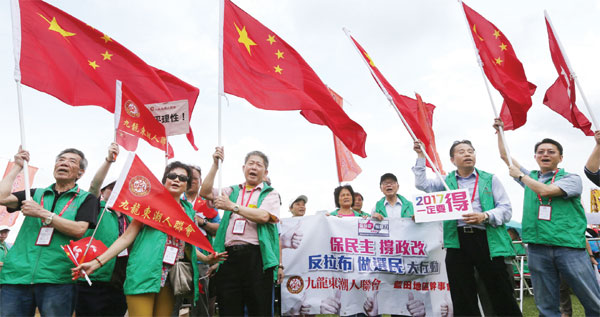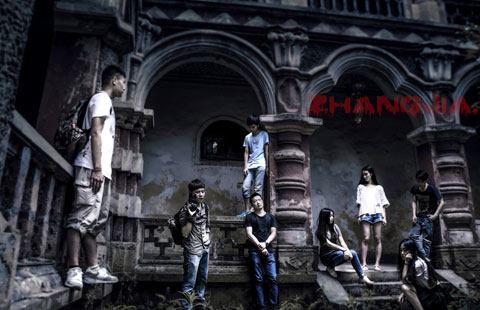Seize the opportunity to advance HK democratic development
Updated: 2015-06-17 14:59
(Xinhua)
|
||||||||
 |
| Residents of Kowloon East wave national flags and shout slogans in support for the electoral reform package at a rally in Tamar Park on June 6, 2015. [Parker Zheng / China Daily] |
BEIJING - Wednesday marks a pivotal moment for the future of democracy in Hong Kong.
Members of the Hong Kong Special Administrative Region (HKSAR) Legislative Council (LegCo) is debating and will vote on a motion to elect the SAR's next leader by public vote for the first time in 2017.
Never before has the Hong Kong public been so close to the dream of securing a "one man, one vote" chief executive election.
Voters are now placing their trust on lawmakers to cast their votes with Hong Kongers' best interests and the city's prosperity in mind, approve the motion and give the SAR's democratic development a welcome boost.
Democracy was but a mirage during Britain's colonial rule of Hong Kong for over 150 years. Successive Hong Kong governors were all appointed by Britain rather than by Hong Kong citizens, while the British took the majority of senior positions in the Hong Kong government.
It was not until Hong Kong's return to China in 1997 that greater political rights were bestowed to Hong Kong citizens, thanks to the implementation of the principles of "one country, two systems" and "Hong Kong people governing Hong Kong" with a high degree of autonomy.
For the past 18 years, the international community has witnessed substantial democratic and constitutional development in the Asian financial hub.
One ultimate goal of the Basic Law, Hong Kong's mini-Constitution, is to achieve universal suffrage in the chief executive election, and two separate legal decisions passed by China's top legislature, issued in 2007 and 2014 respectively, confirmed the central government's support of this proposal.
Before the electoral reform plan was unveiled, the central authorities reached out to people from all walks of life in Hong Kong to explain its decisions, and the HKSAR government held two public consultations.
The plan proposes that SAR chief executive candidates will be picked by a 1,200-member nominating committee from four social sectors consisting of 38 sub-sectors.
Wednesday's motion, an embodiment of the principles of balanced participation and consultative democracy, is the most democratic institutional arrangement and the most viable institutional innovation in the history of Hong Kong.
The LegCo's deliberation on the motion should be the "last push" in Hong Kong's democratic drive.
Should the motion be passed, this could translate into greater social solidarity and development in Hong Kong, and could help the new chief executive improve governance. It is also conducive to Hong Kong's economic growth, improvement of people's livelihoods and the advancement of the cause of "one country, two systems."
However, if the motion is rejected, Hong Kong's constitutional development would reach an impasse. Antagonism in Hong Kong would surge; the society risks being torn further apart; and the city may dwindle into trivial political bickering, with its economic and civic development arrested.
Members of LegCo bear an important constitutional role in amending the legal procedures for the SAR chief executive election. They must vote for what is best for the nation, Hong Kong and its citizens.
Lawmakers are to be reminded that they have pledged allegiance to the Hong Kong SAR of the People's Republic of China when taking office. Thus, they are responsible for safeguarding China's national sovereignty, security and development interests, and are obliged to abide by Hong Kong's Basic Law and protect the overall interests of HKSAR.
Their votes will serve as the touchstone by which legislators' support for democracy, the principle of "one country, two systems" and Basic Law will be measured.
Should legislators make the right decision based on the mainstream public will and endorse the motion, their contributions to Hong Kong's democratic and constitutional development will be written into history.
However, if they choose to oppose social advancement - allowing personal gains and political scheming to kidnap public opinions - they will be held accountable for obstructing democratic development in Hong Kong for generations and beyond.
Hong Kong residents are at the doorstep of a new era, and just one step away from securing universal suffrage for the 2017 chief executive election.
It is the sincere hope of the general public that each legislator casts his or her vote responsibly and help turn a brand new page in Hong Kong's democratic progress.
 Warriors beat Cavaliers to clinch NBA title
Warriors beat Cavaliers to clinch NBA title
 Saving dogs from dog meat carnival
Saving dogs from dog meat carnival
 Ten photos you don't wanna miss - June 17
Ten photos you don't wanna miss - June 17
 Race-goers get ahead with hats
Race-goers get ahead with hats
 Top 10 most valuable auto brands in the world
Top 10 most valuable auto brands in the world
 Ten photos you don't wanna miss - June 16
Ten photos you don't wanna miss - June 16
 Shaolin monks harvest bumper crop
Shaolin monks harvest bumper crop
 Cambridge students mark end of exam with boat race
Cambridge students mark end of exam with boat race
Most Viewed
Editor's Picks

|

|

|

|

|

|
Today's Top News
Donald Trump announces bid for US presidency
Vote to begin on Hong Kong's election reform
US is duty-bound to help Iraq wipe out the IS: Opinion
China, US spearhead MERS fight
Key China-US talks
next week
Jeb Bush announces bid for 2016 Republican presidential run
China military says two more top officers probed for graft
Alibaba set for online video-streaming launch
US Weekly

|

|






